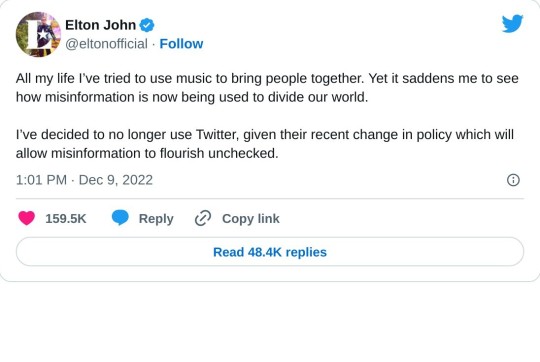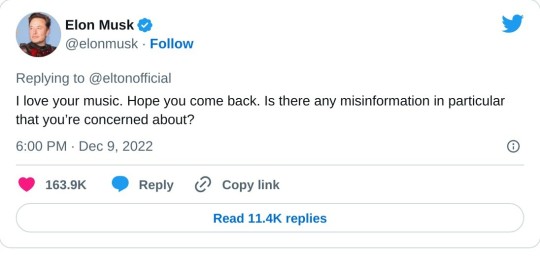#writefreely
Text
Oh wow! I am surprised that @eltonjohn has left Twitter. Maybe he will return to @Tumblr‽

Not surprisingly Elon Musk replied:

I do not think that Elon Musk realizes that he is the problem here.
In recent days, the platform’s new CEO has reactivated the accounts of known neo-Nazis; shared a picture of a white supremacist who said he’d like Trump to be more like Hitler; failed to prevent users from posting videos of the Christchurch massacre; tweeted a popular alt-right meme; used a known antisemitic trope; and, inadvertently or not, shared a dogwhistle that white supremacists interpreted as praise for Hitler. […]
“As soon as he took over Twitter, we saw extremists trying to exploit the platform, we’ve seen hate of all kinds increase, so these messages that he’s sending have to be understood in the context of what is happening to that platform,” Oren Segal, vice president of the Anti-Defamation League’s Center on Extremism, told VICE News. “As it’s becoming a hellscape for antisemitism and racism and bigotry, it just so happens that he is putting out the type of language that is appreciated by those who are doing that.”
This is a major problem. I have noticed a massive increase of hate upon the platform of all kinds (not just white supremacy). Right now companies are fighting for the right to replace Twitter, but Tumblr & Mastodon are leading that fight.
For what it’s worth this whole Twitter debacle has reignited the geek passion within me which inspired me to:
Double down on Tumblr by investing resources here & Darnell.co
Upgrade my Vimeo account (which was expensive) to integrate with current & future sites
Upgrade my WordPress account: Darnell.tv
Launch a solo hosted Mastodon account: one.Darnell.one/@Darnell
Launch a solo hosted Pixelfed account: darnell.app/darnell (as I am having unrelated issues with Instagram)
Launch a solo hosted Matrix account: Darnell.ooo
Start a solo hosted WriteFreely account: Darnell.day (it’s a blog platform that is fully integrated with ActivityPub)
Restart my medium account: Darnell.Africa
I do not think Twitter will disappear completely from the Internet (pending governmental fines), but if the place becomes too toxic I desire avenues I can express myself upon without interference.
#twitter#elton john#elon musk#social networks#tumblr#tumblr is the future#wordpress#mastodon#pixelfed#matrix#writefreely#activitypub#vimeo#self hoster#own your stuff#medium
28 notes
·
View notes
Text
Every time Tumblr staff fucks it up a little more I get a bundle of motivation to keep working on my self hosted server to end up with my own homegrown blog site
Probably made with WriteFreely or that Rust one (Pluma? Plume?) because federation fucks
2 notes
·
View notes
Text
So yeah, i decided to give a big f at wix and now my "blog" are fully on the fediverse for now :
If you want to follow it with your fadiverse account, don't hesitate :D I will little by little add all my blog article on it ahah ( it will be so clustered :S)
0 notes
Text
Update time: Checking in for the Year of Balance and Future Plans
The Update on how my Yearly theme is going and my plans going forward!
Man I would like the Tumblr integration to work again...
0 notes
Text

🌻🖤🌙
1 note
·
View note
Text
#FeedReaderFriday: A Suggestion for Changing our Social Media Patterns

In the recent Twitter Migration, in addition to trying out Mastodon, I’ve been seeing some people go back to blogs or platforms like Micro.blog, WordPress, Tumblr, WriteFreely (like Mastodon it’s a part of the Fediverse, but built for blogging instead of short posts) and variety of others. They’re looking for a place where they can truly own and share their content, often in healthier and more humane ways. Many are extolling the virtues of posting on their own website so that they own their content to protect against the sort of platform problems many are now seeing and experiencing on the rapidly dying birdsite. I’ve seen a growing number of people in/on several platforms reviving the early Twitter practice of #FollowFriday to help people discover new and interesting people to follow.
As a result, while everyone is exploring new platforms and new online spaces for maintaining their identities and communicating, I’m going to suggest something else interesting to shift our online social patterns: Instead of spending time on Twitter, Mastodon, Instagram, or other major social platforms, start practicing #FeedReaderFriday by carving out some time to find and follow people’s websites directly with a feed reader or social reader. Then engage with them directly on their own websites.
I already spend a reasonable amount of time in a variety of readers looking at both longform articles as well as social media posts (status updates, notes, bookmarks, and photos), but starting this Friday, I’m going to practice #FeedReaderFriday. Instead of opening up Twitter or Mastodon, I’ll actively and exclusively reach for one of my feed readers to read people’s content and respond to them directly.
As part of the effort, I’ll share people’s sites I follow and enjoy. I’ll also suggest some feed readers to try out along with other related resources. I’ll use the tag/hashtag #FeedReaderFriday to encourage the website to website conversation. If you’re interested in the experiment, do come and join me and help to spread the word.
Currently I’m relying on readers like Inoreader, Micro.blog, and Monocle, but there are a huge variety of feed readers and a nice selection of even more fully featured social readers available.
Just as many people are doing the sometimes difficult but always rewarding emotional labor of helping people migrate from the toxicity of Twitter and its algorithmic feeds, perhaps those of us who have websites and use social readers could help our friends and family either set up their own spaces or onboard them to social readers in this effort? Mastodon’s decentralized nature is an improvement and provides a reasonable replacement for Twitter, but eventually people will realize some of the subtle issues of relying on someone else’s platform just as they’ve seen issues with Twitter, Facebook, Instagram, or the now defunct Google+.
Feel like you’ll miss people’s content on traditional social media? There are definitely a variety of ways to follow them in a variety of feed and social readers. Not sure what RSS is? Feel free to ask. Know of some interesting tricks and tools you use to make discovering and subscribing to others’ blogs easier? Share them! Have fantastic resources for discovering or keeping up with others’ websites? Share those too. Not quite sure where to begin? Ask for some help to better own your online identity and presence.
It may be a slow start, but I think with some care, help, and patience, we can help to shift both our own as well as others’ online social reading and correspondence habits to be kinder, smarter, and more intentional.
What will you read on #FeedReaderFriday? Who will you recommend following?
Featured photo by Dulcey Lima on Unsplash
#digital humanism#fediverse#feed readers#FeedReaderFriday#FollowFriday#Mastodon#micro.blog#RSS#silos#social media#social readers#Tumblr#Twitter#Twitter migration#WordPress#WriteFreely#IndieWeb
0 notes
Text
Author Interview – Rose McKinney – Nature-Girl Vs Worst Nightmare
When I started playing with my friends and I came up with the character Nature-Girl and I wanted to tell her story. My mummy and daddy both write books and I think it’s really cool so I wanted to write a book to be like them. I’m super lucky because they said I could and liked my ideas.
For more read just click this link:
#authorinterview#nightmare#nature#girls#worst#books#sirenstories#writing#protagonist#inspired#antagonist#mainconflict#writefreely#advice#Planning#accomplishment#effort#SocialMediaLinks#readers#website
0 notes
Text
In other amazing news, Tumblr is looking to incorporate ActivityPub.
This is huge.
Automattic has just finished implementing this on WordPress, and last year when Twitter began to implode they announced they were planning to do it on Tumblr, too.
For WordPress, it means people using a fediverse account can follow a WordPress blog. You can't "follow back" a fediverse account from WordPress, but I don't think that's a thing WordPress does anyway.
Once caveat for WordPress though - you can only do it if you're paying at least $9 a month for a business account. Since it's only one-directional, that's not worth it to me.
For Tumblr, my hope would be that not only could people on the fediverse subscribe to your Tumblr feed, but you could follow them back via Tumblr, aka full ActivityPub integration.
Would I pay for that on Tumblr? You know, I might. But only if it was full integration, and people could follow federated accounts from Tumblr, and people on the fediverse could follow Tumblr accounts from their instance.
Either way, that would mean the ability to follow someone on PixelFed, or Mastodon, or PeerTube, or WriteFreely, etc, etc etc.
One of the problems of the mass exodus and migration from Twitter is that lots of people and communities got disconnected from one another as folks found new sites to settle in to. Some people found they didn't like Pillowfort's UI, or Tumblr and Instagram were too restrictive for their art, etc etc etc.
ActivityPub allows everyone to reconnect, even if they all settled on different sites!!!
12 notes
·
View notes
Text
…anyways, i will not be using cohost. i’ll be moving to like. my own website, probably writefreely or wordpress based. will be compatible with activitypub.
1 note
·
View note
Text
Voi che sapete tutto e di tutto avete già fatto esperienza avete un’opinione sul Fediverso, Livello Segreto, Plenoma, Plume o Writefree o qualsiasi altra piattaforma social, microblogging CMS che possa sostituire questa in cui ci troviamo e anche tutte le altre diventate malsane e dannose per la psiche umana?
Sto leggendo in giro, ma sinceramente trovo che sia tutto troppo rudimentale o semplicemente un po’ meno userfriendly forse per evitare la deriva capitalistico-consumista che ne scaturirebbe se fossero troppo immediate per la massa.
In parole povere è la parte social del web creata indipendentemente per chi non vuole nutrire Marco e combriccola, ma come al solito queste vie di fuga sono poco pratiche e povere quindi serve la collaborazione attiva degli users e chi non vuole sbattersi (come me) deve campare su chi invece ha grinta e capacità, che sono sempre meno.
Cioè voi ne avete almeno mai sentito parlare?
13 notes
·
View notes
Text
Less Is More
I am going to let my @wordpress subscription expire next month. I have been struggling with typing out posts & I could not figure out why until now: WordPress is engineered for content, but @Tumblr & WriteFreely are designed for creating content (the latter two differ). Update: I decided to keep WordPress but let my Vimeo subscription lapse.
Tumblr’s interface is very informal, which is less intimidating when creating content. I can just be informal & keep typing. WriteFreely on the other hand offers distraction free typing as you do not have to worry about performance metrics (comments, likes, reposts, etcetera).
I will just maintain 4 blogs instead of 5 which has reignited my passion for posting again.
I will move political posts as well as personal ramblings to this site. @darnell will be for inspirational items while @darnellafrica will be my thoughts on all things about the Continent (I previously posted on @medium but I was not a fan of my content being behind a paywall.
Other sites I will not be active on:
I will also leave Twitter in the future after Threads by Instagram launches.
I am debating about continuing to use @vimeo (which I have used for years) due to the price. I currently pay for @youtube & @google recently granted me the @ Darnell handle. We shall see.
As much as I enjoy Mix, it seems like a leftover from it’s StumbleUpon days.
I am currently on 16 20 active sites (down from 20) which you can access on Darnell.bio.
6 notes
·
View notes
Text
Fediverse 101: Understanding Mastodon, Pleroma, and Other Platforms
The Fediverse is a fascinating ecosystem that offers a diverse range of platforms, each with its unique features and appeal. One of the prominent platforms within this decentralized network is Mastodon, renowned for its emphasis on community-driven interaction and content moderation.
Mastodon operates on the principle of instances, which are individual servers hosting communities based on shared interests or themes. This structure fosters a sense of belonging and facilitates meaningful conversations within specific niches. Unlike traditional social media, Mastodon allows users to choose an instance that aligns with their preferences regarding content guidelines, moderation policies, and community ethos.
Pleroma, another significant player in the Fediverse, distinguishes itself with its lightweight design and emphasis on customization. Pleroma instances boast efficient resource utilization, making them suitable for users seeking a streamlined experience without compromising functionality. Additionally, Pleroma's extensible architecture enables developers to create tailored solutions and integrations, further enhancing user experience and platform versatility.
Beyond Mastodon and Pleroma, the Fediverse encompasses various other platforms, each contributing to the network's rich tapestry of communication and interaction. PeerTube, for instance, offers a decentralized alternative for video hosting, promoting content freedom and reducing reliance on centralized platforms. Its federation capabilities enable seamless sharing and discovery of videos across different instances, fostering a distributed yet interconnected video ecosystem.
Pixelfed, focusing on image sharing, brings a visually engaging dimension to the Fediverse. With features akin to mainstream photo-sharing platforms, Pixelfed combines familiar user experiences with decentralized principles, empowering creators while ensuring data sovereignty and privacy.
Moreover, the Fediverse extends its reach to platforms like Funkwhale for audio content, WriteFreely for blogging, and more, each catering to specific content types and user preferences. This diversity not only reflects the decentralized nature of the Fediverse but also underscores its resilience and adaptability in catering to evolving digital communication needs.
What unites these platforms is their adherence to interoperability standards like ActivityPub, enabling seamless communication and interaction across disparate platforms. This interoperability fosters a vibrant network where users can engage with content and communities beyond the confines of a single platform, promoting diversity of thought and fostering cross-platform collaboration.
Embark on a Journey into Digital Empowerment with 'Unraveling the Fediverse: A Journey into Decentralized Social Networking.'
Explore the revolutionary landscape of decentralized online communities in this captivating book. Dive into the heart of Web 3.0, where the Fediverse empowers users and redefines social media. Discover federated networks, inclusive design principles, and transparent content discovery algorithms. Witness the rise of decentralized funding models and envision a future where connectivity thrives and user sovereignty reigns. Join the digital revolution and shape the future of online communities.
In conclusion, the Fediverse encompasses a rich tapestry of platforms like Mastodon, Pleroma, PeerTube, Pixelfed, and others, each contributing to a decentralized, user-centric approach to social networking and content sharing. By embracing diversity, interoperability, and community empowerment, the Fediverse exemplifies a compelling alternative to traditional social media paradigms, offering users greater control, privacy, and engagement in the digital landscape.
0 notes
Text
it's me, back to push activitypub based software, this time for those of you who want a more personalized website
if you want to host your own website that hosts primarily writing you could do a hell of a lot worse than writefreely. there are instances that you can sign up to as well but it's not really focused on the social media aspect so much as the personal writing aspect afaik
0 notes
Text
Eros x Tânatos

Em o Mal-estar da Civilização, Freud tenta “sociologizar” a psicanálise. Ele expande a teoria das pulsões para a sociedade com dois princípios opostos: Eros e Tânatos. Eros é o construtor dos laços sociais e Tânatos o destruidor dos laços.
Como sabido, por causa do clima dos anos 30 do século passado na Europa, o clássico freudiano é um exemplo de pessimismo cultural: apesar dos esforços de Eros, no final das contas Tânatos vencerá.
Isso corresponde socialmente a prevalência da pulsão de morte sobre a pulsão de vida. Mas esse dualismo pulsional já havia sido rejeitado por Freud. Tanto Eros como Tânatos são exorbitâncias sociais da pulsão de morte.
A pulsão de morte é estritamente “psíquica”. Quando vamos para a sociedade não há continuidade, mas uma bifurcação pulsional.
Eros é pulsão “vinculada” enquanto Tânatos é pulsão “solta”. Mas ambos os princípios sociais são derivados da mesma pulsão.
Do ponto de vista evolutivo, é um erro dizer que Tânatos (ou a morte) tem a última palavra. A morte de um único ente está a serviço da preservação da espécie como um todo. Tânatos serve a Eros e não o oposto.
Na perspectiva evolutiva, são mais importantes as “cópulas” tanto intra como interespécies, pois são as cópulas que geram diversividade genética.
A evolução é tecida por Eros. Tânatos, no entanto, tem função regenerativa, que está a serviço da criação do tecido.
Assim, a extrema-direita ao mobilizar Tânatos como princípio parece “vencer o jogo”, mas ao final das contas quem vencerá são aquelas forças que acreditarem nos impulsos libidinais.
Contato: [email protected] Mastodon: @[email protected]
publicado com writefreely
0 notes
Text
Merkezi Olmayan Bir Ağ Nasıl Öldürülür
Merkezi Olmayan Bir Ağ Nasıl Öldürülür (Fediverse gibi)
Ploum tarafından 2023-06-23 tarihinde İngilzice yazısından çevrilmiştir
Yıl 2023. Tüm internet GAFAM imparatorluğunun kontrolü altında. Hepsi mi? Tamamı değil. Çünkü birkaç küçük köy baskıya direniyor. Ve bu köylerden bazıları bir araya gelerek "Fediverse "i oluşturmaya başladı.
Twitter ve Reddit'teki tartışmalarla birlikte Fediverse ün ve ilgi kazanmaya başladı. İnsanlar bunu gerçekten kullanmaya başladı. İmparatorluk fark etmeye başladı.

Kapitalistler Rekabete Karşı
Facebook'un önde gelen yatırımcılarından Peter Thiel'in dediği gibi: "Rekabet kaybedenler içindir." Evet, bu sözde "piyasa her zaman haklıdır" diyen insanlar, içinde oldukları zaman bir piyasa istemezler. Onlar tekel istiyorlar. Facebook, kuruluşundan bu yana her türlü rekabeti öldürmek için çok dikkatli davrandı. Bunu yapmanın en kolay yolu, bir gün rakip olabilecek şirketleri satın almak. Instagram, WhatsApp gibi şirketler, sadece ürünleri kullanıcıları cezbettiği ve Facebook'a gölge düşürebileceği için satın alındı.
Ancak Fediverse satın alınamaz. Fediverse, bir protokol (ActivityPub) aracılığıyla tartışan gayri resmi bir sunucu grubudur. Bu sunucular farklı yazılımlar bile çalıştırabilir (Mastodon en ünlüsüdür ancak Pleroma, Pixelfed, Peertube, WriteFreely, Lemmy ve diğerleri de olabilir).
Merkezi olmayan bir ağı satın alamazsınız!
Ama başka bir yol daha var: onu alakasız hale getirmek. Google'ın XMPP ile yaptığı da tam olarak buydu.
Google XMPP federasyonuna nasıl katıldı?
yüzyılın sonunda, anlık mesajlaşma programları (IM) çok popülerdi. İlk çok başarılı olanlardan biri ICQ idi, hemen ardından MSN messenger geldi. MSN Messenger zamanın Tiktok'uydu: gençlerin yetişkinler olmadan saatler ve günler geçirebileceği bir dünya.
MSN Microsoft'un bir parçası olduğu için Google rekabet etmek istedi ve 2005 yılında Gmail arayüzüne dahil ederek Google Talk'u sundu. Unutmayın ki o zamanlar akıllı telefon yoktu ve çok az web uygulaması vardı. Uygulamaların bilgisayara yüklenmesi gerekiyordu ve Gmail web arayüzü çığır açıcıydı. Hatta MSN bir noktada Microsoft Windows ile birlikte geliyordu ve onu kaldırmak gerçekten zordu. Google chat'i Gmail web arayüzüyle birlikte kurmak, müşterilere işletim sistemindeki yerleşik bir yazılımdan daha yakın olmanın bir yoluydu.
Google ve Microsoft hegemonya elde etmek için savaşırken, özgür yazılım meraklıları merkezi olmayan anlık mesajlaşma oluşturmaya çalışıyordu. E-posta gibi, XMPP de birleştirilmiş bir protokoldü: birden fazla sunucu bir protokol aracılığıyla birlikte konuşabilir ve her kullanıcı bir istemci aracılığıyla belirli bir sunucuya bağlanabilirdi. Bu kullanıcı daha sonra herhangi bir istemciyi kullanarak herhangi bir sunucudaki herhangi bir kullanıcıyla iletişim kurabilirdi. ActivityPub ve dolayısıyla Fediverse hala bu şekilde çalışmaktadır.
2006 yılında Google talk XMPP uyumlu hale geldi. Google XMPP'yi ciddi olarak düşünüyordu. 2008 yılında işteyken telefonum çaldı. Hattaki biri bana şöyle dedi: "Merhaba, biz Google ve sizi işe almak istiyoruz." Birkaç arama yaptım ve beni XMPP-dev listesi aracılığıyla buldukları ve XMPP sunucuları sistem yöneticilerini aradıkları ortaya çıktı.
Yani Google federasyonu gerçekten benimsiyordu. Bu ne kadar havalıydı? Bu, aniden her bir Gmail kullanıcısının bir XMPP kullanıcısı olması anlamına geliyordu. Bu sadece XMPP için iyi olabilirdi, değil mi? Kendimden geçmiştim.
Google XMPP'yi nasıl öldürdü?
Tabii ki gerçek biraz daha az parlaktı. Her şeyden önce, XMPP standardını geliştirmek için işbirliği yapmasına rağmen, Google kimsenin inceleyemediği kendi kapalı uygulamasını yapıyordu. Geliştirdikleri protokole her zaman saygı göstermedikleri ortaya çıktı. Her şeyi uygulamıyorlardı. Bu da XMPP gelişimini yavaşlatmaya ve uyum sağlamaya zorladı. Güzel yeni özellikler Google Talk ile uyumlu olmadıkları için XMPP istemcilerinde uygulanmadı veya kullanılmadı (avatarların XMPP'ye gelmesi çok uzun zaman aldı). Federasyon bazen bozuldu: saatlerce veya günlerce Google ve normal XMPP sunucuları arasında iletişim mümkün olmazdı. XMPP topluluğu Google sunucularının gözlemcisi ve hata ayıklayıcısı oldu, düzensizlikleri ve kesinti sürelerini yayınladı (bunu birkaç kez yaptım, muhtemelen iş teklifinin nedeni de buydu).
Ve "gerçek XMPP" kullanıcılarından çok daha fazla Google talk kullanıcısı olduğu için, "Google talk kullanıcılarını önemsememek" için çok az yer vardı. XMPP'yi yeni keşfeden ve kendileri Google talk kullanıcısı olmayanlar çok sinir bozucu bir deneyim yaşadılar çünkü bağlantılarının çoğu Google Talk kullanıcısıydı. Onlarla kolayca iletişim kurabileceklerini düşündüler, ancak bu temelde Google talk kullanırken sahip olduklarının bozulmuş bir versiyonuydu. Tipik bir XMPP kadrosu çoğunlukla Google Talk kullanıcılarından ve birkaç inekten oluşuyordu.
2013 yılında Google, XMPP etkileşimlerinin çoğunun zaten Google Talk kullanıcıları arasında olduğunu fark etti. Kontrolün %100 kendilerinde olmadığı bir protokole saygı duymak umurlarında değildi. Bu yüzden fişi çektiler ve artık federe olmayacaklarını duyurdular. Ve Hangout ile başlayan uzun bir mesajlaşma programı yaratma arayışı başladı (bunu Allo, Duo takip etti. Ondan sonra saymayı bıraktım).
Beklendiği gibi, hiçbir Google kullanıcısı gözünü kırpmadı. Aslında, hiçbiri fark etmedi. En kötü ihtimalle, bazı bağlantıları çevrimdışı oldu. Hepsi bu kadar. Ancak XMPP federasyonu için, kullanıcıların çoğunluğu aniden ortadan kaybolmuş gibiydi. Hizmetçiniz gibi XMPP fanatikleri bile arkadaşlarıyla iletişimlerini sürdürebilmek için Google hesapları oluşturmak zorunda kaldı. Unutmayın: onlar için biz sadece çevrimdışıydık. Bu bizim hatamızdı.
XMPP hala var olsa ve çok aktif bir topluluk olsa da, bu darbeden asla kurtulamadı. Google'ın benimsemesiyle ilgili çok yüksek beklentiler büyük bir hayal kırıklığına ve sessiz bir unutuluşa yol açtı. XMPP bir niş haline geldi. O kadar niş bir hale geldi ki grup sohbetleri (Slack, Discord) moda olduğunda, özgür yazılım topluluğu XMPP ile grup sohbetleri zaten mümkünken rekabet etmek için onu (Matrix) yeniden icat etti. (Feragatname: Matrix protokolünü hiç incelemedim, bu nedenle XMPP ile teknik olarak nasıl karşılaştırılacağı konusunda hiçbir fikrim yok. Sadece aynı sorunu çözdüğüne ve XMPP ile aynı alanda rekabet ettiğine inanıyorum).
Google hiç katılmasaydı ya da bir parçası olarak düşünülmeseydi XMPP bugün farklı olur muydu? Bunu kimse söyleyemez. Ancak ben daha yavaş ve belki de daha sağlıklı büyüyeceğine inanıyorum. Bugün olduğundan daha büyük ve daha önemli olurdu. Varsayılan merkezi olmayan iletişim platformu olurdu. Kesin olan bir şey var: Google katılmamış olsaydı, XMPP bugün olduğundan daha kötü olmazdı.
Bu ilk değildi: Microsoft Playbook
Google'ın XMPP'ye yaptığı şey yeni değildi. Aslında 1998 yılında Microsoft mühendisi Vinod Vallopllil açıkça "OSS saldırılarını engellemek" başlıklı bir metin yazmış ve burada "protokolleri ve uygulamaları meta olmaktan çıkarmayı […]" önermişti. Bu protokolleri genişleterek ve yeni protokoller geliştirerek OSS projelerinin pazara girişini engelleyebiliriz."
Microsoft bu teoriyi Kerberos güvenlik protokolü için destek sunan Windows 2000'in piyasaya sürülmesiyle uygulamaya koydu. Ancak bu protokol genişletilmişti. Bu uzantıların spesifikasyonları serbestçe indirilebiliyordu ancak bu uzantıları uygulamanızı yasaklayan bir lisansı kabul etmeniz gerekiyordu. "Tamam "a tıkladığınız anda Kerberos'un açık kaynak kodlu hiçbir sürümü üzerinde çalışamazdınız. Amaç açıkça Samba gibi rakip ağ projelerini öldürmekti.
Glyn Moody'nin "Rebel Code" adlı kitabında anlattığı bu anekdot, açık kaynak ve merkezi olmayan projeleri öldürmenin gerçekten bilinçli hedefler olduğunu göstermektedir. Bu asla rastgele gerçekleşmez ve asla kötü şanstan kaynaklanmaz.
Microsoft, tescilli formatlar kullanarak Microsoft Office ile ofis pazarında hakimiyet sağlamak için benzer bir taktik kullandı (bir dosya formatı veri alışverişi için bir protokol olarak görülebilir). Alternatifler (OpenOffice ve ardından LibreOffice) doc/xls/ppt formatlarını açmada yeterince iyi hale geldiğinde, Microsoft "açık ve standartlaştırılmış" olarak adlandırdığı yeni bir format yayınladı. Bu format kasıtlı olarak çok karmaşık (20.000 sayfa spesifikasyon!) ve en önemlisi yanlıştı. Evet, spesifikasyonda bazı hatalar vardı, bu da OOXML formatının tamamını uygulayan bir yazılımın Microsoft Office'ten farklı davranacağı anlamına geliyordu.
Bu hatalar, siyasi lobi faaliyetleriyle birlikte, Münih kentini Linux'a geçişi geri almaya iten nedenlerden biriydi. Yani evet, strateji iyi çalışıyor. Bugün, docx, xlsx ve pptx hala bu yüzden normlar. Kaynak: Ben oradaydım, dolaylı olarak Münih şehri tarafından LibreOffice OOXML'nin şartnamelere uymak yerine Microsoft'unkine daha yakın hale getirilmesi için ödeme yapıldı.
GÜNCELLEME:
Bu taktiğin bir Wikipedia sayfası bile var
Meta ve Fediverse
Tarihi bilmeyen insanlar onu tekrar etmeye mahkumdur. Meta ve Fediverse'de olan da tam olarak bu.
Meta'nın "Fediverse uyumlu" hale geleceğine dair söylentiler var. Mastodon hesabınızdan Instagram'daki insanları takip edebilirsiniz.
Bu söylentilerin doğruluk payı var mı, Meta'nın bunu düşünmesi mümkün mü bilmiyorum. Ancak XMPP ve OOXML ile ilgili kendi deneyimlerimin bana öğrettiği bir şey var: Meta Fediverse'e katılırsa, kazanan sadece Meta olacaktır. Aslında, tepkiler zaten onların kazandığını gösteriyor: Fediverse Meta'yı engellemek ya da engellememek arasında bölünmüş durumda. Bu gerçekleşirse, yeni gelenler için çok az çekiciliği olan parçalanmış, sinir bozucu iki katmanlı bir fediverse anlamına gelecektir.
GÜNCELLEME: Bu söylentiler, fosstodon.org'dan en az bir Mastodon yöneticisi olan kev'in Meta ile kayıt dışı bir toplantıda yer alması için temasa geçmesiyle doğrulandı. Olabilecek en iyi tepkiyi verdi: kibarca reddetti ve en önemlisi, kullanıcılarına karşı şeffaf olmak için e-postayı yayınladı. Teşekkürler Kev!
Meta'dan Kev'e, Fosstodon'dan gelen posta ve yanıt
Hepimizin tüm arkadaşlarımızın ve ailemizin Fediverse'de olmasını hayal ettiğimizi biliyorum, böylece özel ağlardan tamamen kurtulabiliriz. Ancak Fediverse pazar hakimiyeti ya da kar peşinde değil. Fediverse büyüme peşinde değil. Özgürlük için bir yer sunuyor. Fediverse'e katılan insanlar özgürlük arayanlardır. Eğer insanlar hazır değillerse veya özgürlük aramıyorlarsa, sorun değil. Tescilli platformlarda kalma hakları vardır. Onları Fediverse'e girmeye zorlamamalıyız. Her ne pahasına olursa olsun olabildiğince çok insanı dahil etmeye çalışmamalıyız. Dürüst olmalı ve insanların Fediverse'e arkasındaki bazı değerleri paylaştıkları için katıldıklarından emin olmalıyız.
Her ne pahasına olursa olsun beyinsiz büyüme ideolojisinde Meta'ya karşı yarışarak kaybedeceğimiz kesin. Onlar bu oyunun ustası. Herkesi kendi alanlarına çekmeye, sattıkları silahları kullanarak insanları kendilerine karşı yarıştırmaya çalışıyorlar.
Fediverse sadece zeminini koruyarak, özgürlük, ahlak, etik ve değerler hakkında konuşarak kazanabilir. Açık, ticari olmayan ve spekülasyon içermeyen tartışmalar başlatarak. Amacın kazanmak olmadığını kabul ederek. Kucaklamak değil. Amaç bir araç olarak kalmaktır. Birbirine bağlı insanlar için bir özgürlük alanı sunmaya adanmış bir araç. Hiçbir ticari kuruluşun sunamayacağı bir şey.
Resim David Revoy tarafından
Nicolas Vivant tarafından Fransızcaya çevrildi
İspanyolca Matii Çevirisi
Deutsche Übersetzung von Janet und anderen
Traduzione italiana di Nilocram
0 notes